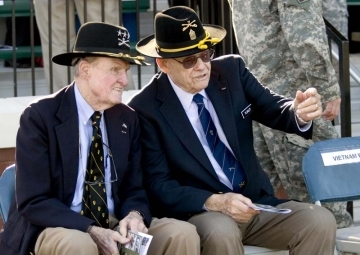Basil L. Plumley, a renowned career soldier whose exploits as an Army infantryman were portrayed in a book and the movie “We Were Soldiers,” has died at 92 ― an age his friends are amazed that he lived to see.
Plumley fought in World War II, the Korean War and Vietnam and was awarded a medal for making five parachute jumps into combat. The retired command sergeant major died Wednesday.
Friends said Plumley, who died in hospice care in west Georgia, never told war stories and was known to hang up on people who called to interview him. Still, he was near-legendary in the Army and gained more widespread fame through a 1992 Vietnam War book that was the basis for the 2002 movie starring Mel Gibson. Actor Sam Elliott played Plumley in the film.
Plumley didn’t need a Hollywood portrayal to be revered among soldiers, said Greg Camp, a retired Army colonel and former chief of staff at neighboring Fort Benning who befriended Plumley in his later years.
 |
Retired Command Sgt. Maj. Basil L. Plumley (right) at the National Infantry Museum and Soldier Center in Columbus, Georgia, in 2009. (AP) |
“He’s iconic in military circles,” Camp said. “Among people who have been in the military, he’s beyond what a movie star would be. ... His legend permeates three generations of soldiers.”
Debbie Kimble, Plumley’s daughter, said her father died from cancer after spending about nine days at Columbus Hospice. Although the illness seemed to strike suddenly, Kimble said Plumley’s health had been declining since his wife of 63 years, Deurice Plumley, died last May on Memorial Day.
A native of Shady Spring, West Virginia, Plumley enlisted in the Army in 1942 and ended up serving 32 years in uniform. In World War II, he fought in the Allied invasion of Italy at Salerno and the D-Day invasion at Normandy. He later fought with the 187th Airborne Infantry Regiment in Korea. In Vietnam, Plumley served as sergeant major ― the highest enlisted rank ― in the 1st Battalion, 7th Cavalry Regiment.
“That puts him in the rarest of clubs,” said journalist Joseph L. Galloway, who met Plumley while covering the Vietnam War for United Press International and remained lifelong friends with him. “To be combat infantry in those three wars, in the battles he participated in, and to have survived ― that is miraculous.”
It was during Vietnam in November 1965 that Plumley served in the Battle of la Drang, the first major engagement between the U.S. Army and North Vietnamese forces. That battle was the basis for the book “We Were Soldiers Once ... And Young,” written nearly three decades later by Galloway and retired Lt. Gen. Hal G. Moore, who had been Plumley’s battalion commander in Vietnam.
In the 2002 film version, Mel Gibson played Moore and Elliott played Plumley. Galloway said several of Elliott’s gruff one-liners in the movie were things Plumley actually said, such as the scene in which a soldier tells the sergeant major good morning and is told: “Who made you the (expletive) weather man?”
“Sam Elliott underplayed him. He was actually tougher than that,” Galloway said. “He was gruff, monosyllabic, an absolute terror when it came to enforcing standards of training.”
That’s not to say he was mean or inhuman, Galloway said. “This was a man above all else who had a very big, warm heart that he concealed very well.”
Plumley retired with the rank command sergeant major in 1974 at Fort Benning, his last duty station. He then took a civilian job doing administrative work for the next 15 years at Martin Army Community Hospital.
Camp said Plumley remained strong until just a few weeks before his death. He helped open the Army’s National Infantry Museum at Fort Benning in 2009. Camp, who now works for the museum’s fundraising foundation, said Plumley helped him get Elliott to come narrate a ceremony dedicating the parade ground outside the museum. When Camp mentioned the actor’s name, Plumley handed him Elliott’s cellphone number.
After Plumley became ill, Galloway mentioned his worsening condition on Facebook. Fans of the retired sergeant major responded with a flood of cards and letters. The day before he died in hospice, Camp said, Plumley received about 160 pieces of mail.
“He was dad to me when I was growing up,” said Kimble, Plumley’s daughter. “We are learning every day about him. He was an inspiration to so many. He was a great person, and will always be remembered.” (AP)






![[Exclusive] Hyundai Mobis eyes closer ties with BYD](http://res.heraldm.com/phpwas/restmb_idxmake.php?idx=644&simg=/content/image/2024/11/25/20241125050044_0.jpg)

![[Herald Review] 'Gangnam B-Side' combines social realism with masterful suspense, performance](http://res.heraldm.com/phpwas/restmb_idxmake.php?idx=644&simg=/content/image/2024/11/25/20241125050072_0.jpg)